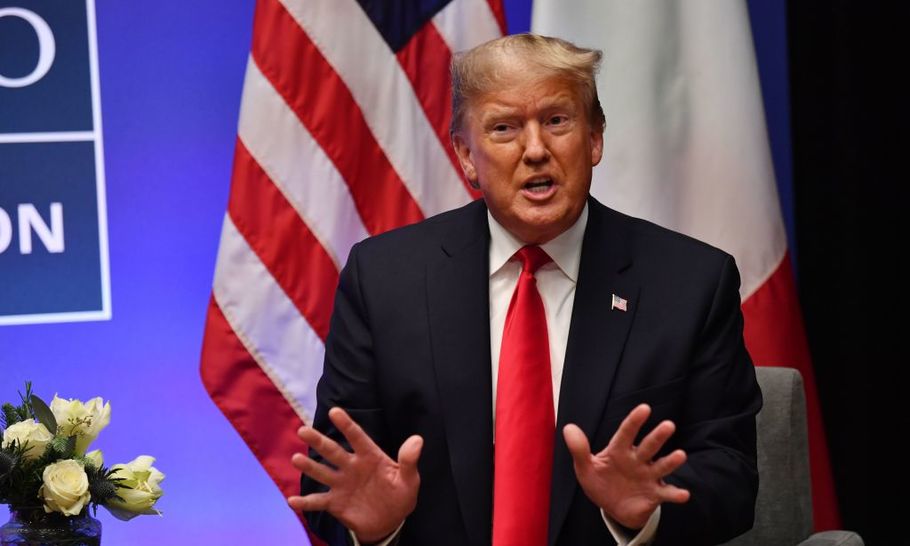Terror, Trump and ten points in it: Week 5 on the campaign trail

Donald Trump, December 2019. ( Nicholas Kamm / AFP via Getty Images)
Bloodshed during British elections has, sadly, become all too familiar. There was the murder of Jo Cox in 2016, the Manchester Arena bombing in 2017 and the terror attack last Friday. The murder of two Cambridge graduates on London Bridge that day brought a sombre end to Week 4, and political campaigning was temporarily suspended on Saturday.
But, with so much at stake in this election, the truce didn’t last long. Boris was quick to fault the law introduced by Gordon Brown’s government that secured the early release of the attacker and pledged to reverse it. He then took to the dangerous streets of Salisbury, the site of last year’s Novichok poisonings, while Jeremy Corbyn argued that British military activity has “exacerbated” terrorism.
Of course, the main event this week was the Nato summit in London and the accompanying presence of Donald Trump. This time, there were no press conferences or protests — it was as if all parties had decided that ignoring Trump was the surest way of winning votes. And why wouldn’t they? According to new polling data, Britons regard the US as a greater threat to world peace than Iran and North Korea.
Seeking to “weaponise” Trump’s visit, Labour repeated their “NHS for sale” line of attack and Corbyn himself vowed to confront Trump at the Nato reception at Buckingham Palace. Alas, that confrontation never materialised and Trump maintained that the US wants “nothing to do” with the NHS. Then again, it wouldn’t be surprising if, like in 2016, this presidential intervention (or non-intervention) was encouraged by our Prime Minister.
Thereon, things didn’t get much better for Corbyn, whose name is so toxic that 100 prospective Labour MPs have not included his name or face on their campaign material. Two more former Labour ministers have urged voters to back the Tories and even the New Statesman decided not to endorse Labour this election. In an attempt to shore up their “Red Wall”, Labour gave a more prominent campaign role to northern MPs like Richard Burgon and Ian Lavery this week. But even that backfired, with Lavery accusing the Tories of stealing miners’ pensions only a day after reports surfaced that the National Union of Miners has given him £165,000 since 2010.
From organised labour to disorganised Labour. Corbyn continued his run of unimpressive TV interviews, lying to Julie Etchingham that he watches the Queen’s Speech on the morning of Christmas Day, and apologising for Labour’s anti-Semitism problem on This Morning only after being asked repeatedly to do so. Of course, this came in the same week that he shared a campaign video expressing solidarity with every minority group except the Jewish community, and that a leaked dossier accused him of eleven acts of anti-Semitism.
And yet, despite their lacklustre campaign, according to the latest polling data, Labour has closed the gap on the Tories over the last week, with Boris himself warning that the election will be “very, very tight”. For his part, he is yet to summon up the courage to be grilled by Andrew Neil, despite doing interviews with Andrew Marr and Phillip Schofield, offering to do I’m A Celebrity…Get Me Out of Here! and describing himself as “hard as nails”.
The voting public had to settle, therefore, for Neil’s interviews with Jo Swinson and Nigel Farage, both of whom might soon be out of a job. That didn’t stop Neil from launching into a dramatic monologue that criticised Johnson, in which he noted that, until this election, political leaders invariably participated in the BBC’s interviews. Neil ended: “The Prime Minister of our nation will, at times, have to stand up to President Trump, President Putin, President Xi of China. So it was surely not expecting too much that he spend half an hour standing up to me”. Ouch.
In other news, UKIP (remember them?) launched their manifesto, four Brexit Party MEPs resigned and endorsed the Tories, and the Lib Dems — once an endangered species themselves — were targeted by Extinction Rebellion protestors in the same week that they hired a diesel-fuelled campaign bus. There’s nothing like a bit of green-on-green.
A general election is never complete without the verdict of the rich and famous. This week, forty notables including Sir Mark Rylance, Yanis Varoufakis, Noam Chomsky and Steve Coogan signed a letter to the Guardian backing Labour. The BBC presenter, Richard Osman, tweeted Labour’s mantra that the Tories will “sell off” the NHS and Hugh Grant took to the streets to canvass with various pro-Remain candidates — and he wasn’t filming Love Actually 2.
With six days to go until polling day, a host of last-minute policies were thrown into our Christmas hamper. Continuing their war with the Institute for Fiscal Studies, Labour claimed that they would save families nearly £7000 a year if elected and vowed to provide more teachers, cap school class sizes and end rough sleeping. Meanwhile, Boris committed to tax global tech giants and pass both a Brexit deal and a Budget in his first hundred days.
And so we enter the final week of this general election campaign with the pound at a seven-month high, the Conservatives with a ten-point lead and a Tory majority, for now, the most likely result. But do not forget that Theresa May had a six-point lead at this stage in 2017 — and we all know how that ended. Tonight, there is the final head-to-head debate between Boris and Corbyn and, with snow forecast on polling day next week, all bets are surely off.





